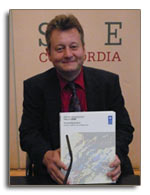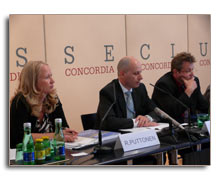 VIENNA, 5 October - The positive benefits of migration in terms of human development were highlighted at a press launch of the Human Development Report in Vienna organized by the United Nations Information Service Vienna (UNIS) and the United Nations Development Programme's (UNDP) Regional Office in Bratislava.
VIENNA, 5 October - The positive benefits of migration in terms of human development were highlighted at a press launch of the Human Development Report in Vienna organized by the United Nations Information Service Vienna (UNIS) and the United Nations Development Programme's (UNDP) Regional Office in Bratislava.
Both countries of origin and destination countries benefit, the report shows, contrary to popular opinion. For countries of origin, positive benefits include financial gains from money sent home by those working elsewhere, reduced fertility rates, higher school enrolment rates and empowerment of women. For destination countries, immigration increases employment, boosts declining population rates and improves business investment.
Introducing the speakers at the launch, UNIS Director Maher Nasser said that the report's focus on human mobility and development was timely and important, particularly at a time when one in every seven of the world's population was a migrant. He emphasized that the report's argument that migration was a process to be managed, not a problem to be solved. As such, more should be done to protect the rights of migrants and reduce discrimination. Reference was also made to the fact that most migrants moved within their own country, accounting for the fact that 2008 was the year when for the first time in human history, over half of the world's population lived in urban areas.
The Deputy Regional Director and Bratislava Regional Centre Director of UNDP, Jens Wandel, presented the report to around 40 journalists, representatives of permanent missions and others at the launch in Presseclub Concordia. He said the 'Human Development Report 2009: Overcoming barriers: Human mobility and development' showed that migration was beneficial for the destination countries, the people who migrate and often for the countries of origin.
 Social remittances, the ideas and practices that flow back to families of migrants, were of great benefit to the development process in the countries of origin particularly for women. Mobility, he said, should be an integral part of development policy. He gave two examples of successful low-skilled worker migration schemes - in New Zealand to regularise seasonal work and in Sweden to manage the entry of migrants. Most people were favourably disposed towards migration when jobs were available he told the launch and opposition to migration was shaped by misconceptions about the consequences.
Social remittances, the ideas and practices that flow back to families of migrants, were of great benefit to the development process in the countries of origin particularly for women. Mobility, he said, should be an integral part of development policy. He gave two examples of successful low-skilled worker migration schemes - in New Zealand to regularise seasonal work and in Sweden to manage the entry of migrants. Most people were favourably disposed towards migration when jobs were available he told the launch and opposition to migration was shaped by misconceptions about the consequences.
Riikka Puttonen from the Anti-Human Trafficking and Migrant Smuggling Unit of the United Nations Office on Drugs and Crime (UNODC) said not all migrants have legal opportunities to migrate and so many profit-seeking criminals take advantage of this. The current focus in the European Union on return and deportation and very little was being done to go after the traffickers or smugglers she said. However Austrian had a good record of prosecuting those involved in trafficking - with 82 convictions between 2005-07 making Austria is one of the forerunners in combating human trafficking. Few countries were as advanced as Austria in convicting and prosecuting traffickers and smugglers, Ms. Puttonen said.
The Human Development Report 2009: Overcoming barriers: Human mobility and development casts new light on common misconceptions about migration. It shows that migration from developing to developed countries accounts for only a tiny fraction of human movement whereas migration from one developing economy to another is much more common and that the overwhelming majority of people move within their own country. This point was emphasized by the UNIS Vienna Director, Maher Nasser, moderating the launch, who asked how many of those present at the launch were born in Vienna - only six people were.
A question was asked about what governments could do to communicate the facts of migration as outlined in the report. Mr. Wandel said that in times of financial crisis like the current one, migration would be restricted but this was a short-term phenomenon and what the report was saying was that migration policy should be an integral part of the global development agenda and should not be separated out. In response to a question on whether the social remittances outweighed the brain drain in the developing world, he said that yes they did to a large extent and that social remittances together with financial ones were a significant part of development and the brain drain was somewhat exaggerated.
When asked about the gender aspects of migration Mr. Wandel said that in a sense women were the best migrants, in that they were empowered by migration, sent more money home and benefited also when left in their countries of origin by becoming more empowered. Overall the balance sheet of migration was hugely positive Mr. Wandel said.
In response to a question about the responsibility of governments to tackle trafficking, Riikka Puttonen said it was a shared responsibility for all countries because not a single country was unaffected by the problem.
In concluding Mr. Wandel said that the social impact of the financial crisis east of the Schengen region in countries like Moldova, Armenia and Ukraine was very severe and that meant we could expect there could potentially be significant pressure on migration to Europe and that made the recommendations of the report all the more relevant.
Audio File (mp3)